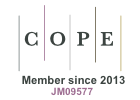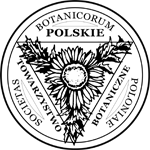Abstract
The effect of exogenous spermidine (0; 1 and 2 mmol·dm-3) on cucumber plant subjected lo seven day drought (30% f.w.c.) were studied. Growth rate of plants, gas exchange, chlorophyll fluorescence, water saturation deficit in tissue (WSD). leakage electrolytes (El as well as the content of free proline were determined. The results showed that drought inhibited growth and gas exchange, decreased the potential efficiency of PSII (Fv/Fm) but increased the value of WSD, EL and the level of free proline in tissue. The spermidine treatment of plants immediately before drought influenced the decrease concentration of free proline, water deficit and leakage of electrolytes but the increase of stomatal conductance (gs), intensity of photosynthesis (Pn ) and transpiration (E). Greater change on the course of primary photosynthetic reactions in PSII (Fv/Fm., ΦPSII, qP, qN) were not detected. The autors concluded, that in drought conditions exogenous speimidine together with proline induced by stress, contribute to increase of water content in tissue and maintenance of the enzymatic activity of cells as well as they guaIantee the integrity of cell membranes. Profitable effect of spermidine on the condition of cucumber in drought period shorted the time necessary for plants to come back to level of control treatment.
Keywords
Cucumis sativus L.; drought; spermidine; proline; plant growth; gas exchange; chlorophyll fluorescence






